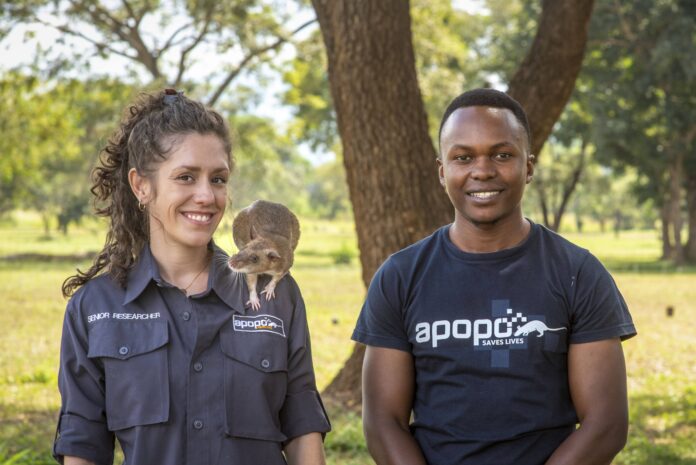When Donna Kean moved from Scotland to Tanzania, she had more than just the culture shock to deal with.
The behavioural scientist from Scotland — whose mother is Canadian — had been more accustomed to working with apes and monkeys, but her new job in east Africa involved a creature less known for its intelligence: the rat.
“I was really unsure about how that leap would be, because we know that primates are super intelligent creatures and it was great — they’re really dextrous — to work with them,” she said from her home in Morogoro, Tanzania.
“With the rats, I was very surprised at just how intelligent they are and how trainable and how quickly they can learn, it was amazing.”
Senior APOPO researcher and animal behavioural scientist Donna Kean with one of her trainee rescue rats.
APOPO
For the past year she has been working with the NGO APOPO, training rats to become invaluable members of earthquake search and rescue teams.
The project involves rats scrambling inside the rubble of collapsed buildings, looking for survivors.
“The unique advantage that the rats bring to the program would be that they’re very small,” said Kean.
“Typically with dogs, they just go around the perimeter of a debris site, but with our rats, we’re hoping they can actually penetrate inside the debris and get closer to victims, to give us a better idea of what’s going on under there and exactly where victims are.”
The rats will wear a special little backpack containing a camera, a location transmitter and a two-way radio, allowing rescuers to communicate with the person who is trapped.
Rats are trained to activate a switch on their backpack when they find a person in the rubble, transmitting a precise location back to rescuers.
Trending Stories
Scarborough shooting leaves 2 in life-threatening condition
Rampant inflation means Bank of Canada must raise rates above 3%: economist
A loud beeping signal will then beckon the rats back to the surface.
Trainee rescue rat Daniel receives a reward of a ‘rat smothie’ containing avocado and banana at the APOPO research facility in Morogoro, Tanzania.
APOPO
Training the rodents takes up to a year and is done with the help of a special rat recipe.
“I think their diet is probably better than mine,” joked Kean.
“The positive reinforcement is kind of like a rat smoothie. So it’s avocado and banana mixed with ground-up rat pellets. We also have peanuts for some of this reinforcement as well.”
Researchers at APOPO have taken into account that injured and traumatized earthquake survivors may not exactly welcome a rat scratching around beside them.
“One thing that we’ve been considering is that [the rats] might play a message like an audio recording that says something like, ‘I am a rescue rat, I’m well trained. I’m here to help you,’” said Kean.
“Something along those lines, we’ll think of the ideal message to put people at ease.”
A trainee earthquake rescue rat at the APOPO research facility in Morogoro, Tanzania.
APOPO
The full prototype backpacks are being developed at Eindhoven University in the Netherlands.
Kean hopes to receive the first of them by July.
Seven rats have been in training since August 2021, and the team at APOPO hope that some of them can eventually be deployed to an earthquake zone in Turkey.
Kean says the rats would not put any rescue dogs out of work, but would complement human and canine teams.
She has named her favourite rat ‘Daniel’ after her nephew, because the animal is “top performing, but the main reason is that he’s really sweet and cuddly.”
Even if some of us may not agree with Kean’s idea of “sweet and cuddly”, APOPO is inviting people to “adopt a rat” to fund their research — and potentially save a life.
The NGO has previously successfully trained rats to sniff out land mines in places like Cambodia and Mozambique, and to detect tuberculosis samples.
© 2022 Global News, a division of Corus Entertainment Inc.



